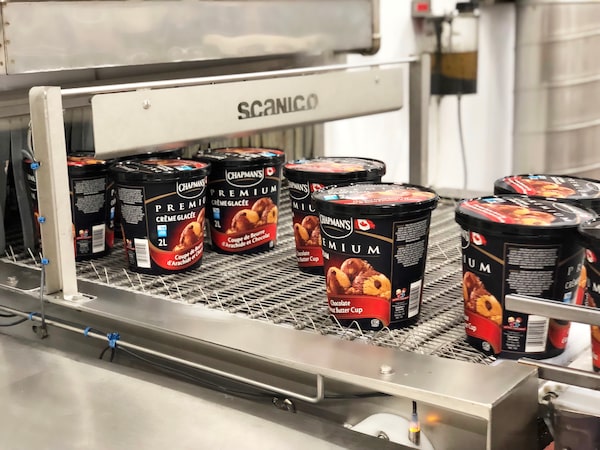
Chapman’s became the target of a slew of anti-vaccination groups late last week after it instituted a new workplace rule that rewarded vaccinated employees with a $1-an-hour pay raise.Supplied
The owner of one of Canada’s largest ice cream producers says an online campaign to boycott his company for its workplace COVID-19 vaccination policy has backfired and has led to renewed interest and support for the brand.
Chapman’s, a Markdale, Ont.-based ice cream manufacturer, became the target of a slew of anti-vaccination groups late last week after it instituted a new workplace rule that rewarded vaccinated employees with a $1-an-hour pay raise. This information became public after a photo of the policy – which was posted on a wall at Chapman’s offices – began circulating in anti-vaccine groups on various social-media platforms such as Telegram.
External reaction to the policy was swift, with calls on a number of platforms to boycott the company, vice-president Ashley Chapman said.
“We got at least 1,000 negative e-mails and so many terrible, cruel comments on our Facebook group. One e-mail asked us why we are employing segregation tactics. The exact words were: ‘Kudos on implementing Nazi-ism into our modern day.’”
But almost immediately after news reports emerged about Chapman’s becoming a target of vaccine deniers, a flood of positive e-mails, phone calls and social-media posts poured in, complimenting the company on its vaccination stand, and urging other companies to adopt similar rules to incentivize vaccinations within their workplaces.
“Over all, the ratio of good comments to bad comments is now about 20 to 1,” Mr. Chapman said. He added that the attempted boycott did not affect the company’s sales. On the contrary, the ice-cream producer has gotten numerous inquiries from Americans asking where they could purchase Chapman’s ice cream.
“It’s certainly taken the edge of the nasty side of things,” he said.
One post in a Telegram group called Unvaxxed Canada accused the company of enforcing discriminatory practices and urged group members to contact the company to express their disapproval.
But Chapman’s Twitter and Facebook pages currently show hundreds of comments in support of the ice-cream brand, many using the hashtag #IStandWithChapmans.
The company had previously paid for rapid tests for employees who refused to be vaccinated, but soon decided that twice-weekly rapid tests (costing $40 each) for about 100 of its unvaccinated employees were costly and unfair to other employees, and thus removed the policy.
“We said, ‘You know what, this isn’t fair. We are giving money to the unvaccinated, and we are not giving anything to vaccinated employees.’ That’s why we decided on the $1 pay increase,” Mr. Chapman said.
He anticipates about 5 of his 850 employees will choose to remain unvaccinated and will have to go on unpaid leave.
Mandating the COVID-19 vaccine for workers has morphed into a controversial subject as major corporations such as Goldman Sachs, Citigroup, Canada’s five major banks and McDonald’s, among many others, have chosen to bar employees from working if they are not fully vaccinated. About 11,000 Boeing Co. employees, or 9 per cent of the U.S. work force, have recently asked to be exempted from the vaccine policy, just as the company is beginning renewed contract negotiations with its employees’ union.
In Ontario, despite outrage from doctors, Premier Doug Ford chose to not make COVID-19 vaccines mandatory for health care workers because of the risk that tens of thousands of them would to leave their jobs.
Editor’s note: The number of unvaccinated employees going on unpaid leave has been corrected in the online version of this story.
Your time is valuable. Have the Top Business Headlines newsletter conveniently delivered to your inbox in the morning or evening. Sign up today.